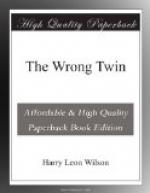After refreshments the young gentlemen withdrew to smoke. They withdrew unostentatiously, through a pergola, round a clump of shrubbery, and on to the stables, where Merle revealed a silver cigarette case, from which he bestowed cigarettes upon them. They lighted these and talked as men of the world.
“Those chickens make me sick,” said the little friend of Merle quite frankly.
“Me, too!” said Wilbur.
They talked of horses, Merle displaying his new thoroughbred in the box stall, and of dogs and motor boats; and Merle and the other boy spoke in a strange jargon of their prep school, where you could smoke if you had the consent of your parents. Merle talked largely of his possessions and gay plans.
They were presently interrupted by the ladies, who, having withdrawn beyond the shrubbery clump to powder their noses from Florrie’s gold vanity box, had discovered the smokers, and now threatened to tell if the gentlemen did not instantly return. So Merle’s little friend said wearily that they must go back to the women, he supposed. And there was more tennis of a sort, more chatter. As Mrs. Harvey D. said, everything moved off splendidly.
Winona, when they left, felt that her charge had produced a favourable impression, and was amazed that he professed to be unmoved by this circumstance, even after being told, as the noble car wheeled them homeward, what the girl, Florrie, had said of him; and that Mrs. Harvey D. Whipple had said she had always known he was a sweet boy. He merely sniffed at the term and went on to disparage the little friends of Patricia.
“You told me not to say ‘darn,’” he protested, “but those girls all said it about every other word.”
“Not really?” said Winona, aghast.
“Darn this and darn that! And darn that ball! And darned old thing!” insisted the witness, imitatively.
“Oh, dear!” sighed Winona.
She wondered if Patricia could be getting in with a fast set. She was further worried about Patricia, because Miss Murtree, over the ice cream, had confided to her that the girl was a brainless coquette; that her highest ambition, freely stated, was to have a black velvet evening gown, a black picture hat, and a rope of pearls. Winona did not impart this item to Wilbur. He was already too little impressed with the Whipple state. Nor did she confide to him the singular remark of Sharon Whipple, delivered to her in hoarsely whispered confidence as Merle spoke at length to the group about his new horse.
“Ain’t he the most languageous critter!” had been Sharon’s words.
And Winona had thought Merle spoke so prettily and with such easy confidence. Instead of regaling Wilbur with this gossip she insinuated his need for flannel trousers, sport shirts with rolling collars, tennis shoes of white. She found him adamant in his resolve to buy no further clothes which could have but a spectacular value.




